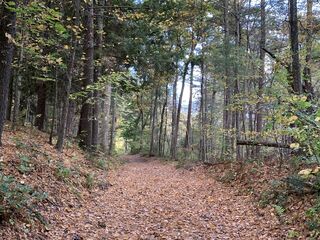Environment
7 Ways Hiking Benefits Your Body, Mind and Spirit
Get out into nature for great physical exercise and a refreshing mental massage.
Posted October 5, 2020 Reviewed by Matt Huston
I didn’t know when I returned in 2007 to eastern Connecticut, where I grew up, that I would discover a hiker's paradise.
I also didn’t know how important hiking would become to me. Not only is it an excellent (and free) workout for my body, but it’s an equally vigorous workout for my mind and emotions.
I’ve been tremendously glad and grateful this year to have easy access to many excellent trails among our rolling hills. During the severest period of our state's sheltering-in-place, in the early spring, and again now in the fall, I have gone out exploring new trails with the help of the AllTrails app on my smartphone.
I’ve scaled cliffs and leapt across streams, crunched leaves and even howled back at coyotes off in the distance. And I’ve felt alive and vital and renewed.

I was hiking one day last month in the Tri-Town Forest Preserve in North Stonington, Conn., when I got the idea for this blog post. I sat on a rock and thought about the benefits of hiking, the payoff for huffing-and-puffing, traipsing through forests, and even sometimes worrying that the coyotes are too close for comfort.
I distilled what, in my view, are hiking’s benefits down to seven:
- Supports health: Hiking is a great way to exercise your heart, lungs, and legs. You can build up endurance by hiking up inclines and rocks. You'll use leg muscles you didn't know you have.
- Keeps you balanced: Most of us take for granted that we can walk across a floor with no problem. But I received an education in how complex and difficult it actually is to maintain balance as I watched my late mom in physical therapy. Hiking on uneven surfaces, like trails, requires muscles in the legs, hips, abdomen, and back (to say nothing of your feet) to keep you striding along and not stumbling.
- Connects you with nature: Hiking in the great outdoors offers a chance to inhale deeply the smells of the woods, listen to the chorus of birds, insects, and other animals, and observe how all the flora and fauna join together to form an interesting and colorful habitat.
- Focuses you in the moment: Time slows down and cares feel a thousand miles away as you navigate your path across uneven terrain, up steep slopes, or winding downward on loose gravel. It’s hard to ruminate or worry about anything when you’re trying to make sure you don’t slide down an embankment or lose the trail entirely as the sun is slipping down the horizon.
- Expands your knowledge: Learn about the trees and plants around you in the forest. For too many years I simply enjoyed the masses of trees without knowing what, exactly, I was looking at. The LeafSnap app on my smartphone lets me snap a photo of a leaf or tree bark and then offers corresponding options as to what type of tree the leaf or bark belongs to. Knowing what you are looking at adds richness to your hike. So does applying this idea in other areas of your life.
- Keeps you mindful of time: If you live in an area with changing seasons, as I do, the seasonal changes you observe in the forest remind you that life also has seasons, time is passing, and there is no time like the present to do whatever you must do to live your best life.
The seventh benefit of hiking, a bit more abstract, came to me during yesterday’s hike at a place called Candlewood Hill Wildlife Management Area, in Groton, Conn. I hadn’t hiked this trail since spring. Now it was October and the trails were covered in fallen leaves. There were no blue or yellow blazes on the trees to guide me, as there had been on the trail I'd hiked the previous day.
A few times it seemed the trail could have gone in any of several directions. Without clear markers, I had to pay attention to flattened leaves that indicated where others had gone before, marking the right way to follow.
It occurred to me that in life, when there are no blazes on the trees to guide us, when the trail is covered in fallen leaves, we have to look for the metaphorical "flattened leaves" others have left to help direct us. We watch how they live and read or listen to their words for guidance.
It also occurred to me that the imprints of my own feet were contributing toward marking the trail for those who will follow. Hiking, you see, isn't only about exercise or fresh air. It's also about life and staying connected to what Thoreau called wildness, the naturalness of nature that stands ready, when we are, to remind us there's a bigger picture that our quotidian worries often don't let us see.


